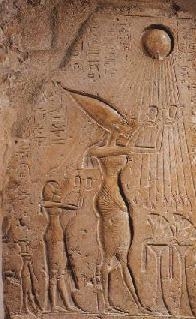|
Other Archaeological Sites / The Neolithic of the Levant (500 Page Book Online) Ancient Tell Amarna
Much light was thrown on writing -- history -- politics -- trade relations as well as manners and customs of Bible lands when in 1887 a peasant woman dug for fertile soil in the mound of Amarna and uncovered the royal archives of Amenhotep III and his royal son Amenhotep IV who early in his career changed his religion and became known as Akhenaton. Eventually more than 350 cuneiform tablets were recovered -- most of which were frank personal letters and dispatches from kings -- governors -- officers located in cities and fortresses of Babylonia -- Mitanni -- Phoenicia -- Syria -- Palestine. The tablets were written between 1400 and 1358 BC and sent to these two pharaohs at the Egyptian court. Most of these tablets were written in the cuneiform language of Babylonia and revealed the fact that for an extended period of time the various peoples of western Asia used the cuneiform as their common language. These clay tablets described Palestine and the surrounding countries as being in a state of turmoil within and as being attacked from without. The governor or officer in charge at Gezer wrote to the pharaoh saying in part: Let my lord the king, the sun in heaven, take heed unto his land, for the Khabiri are mighty against us; and let the king my lord stretch out his hand unto me and let him deliver me from their hands so that they may not make an end of us ..... The tablets show the frequent use of the name Khabiri in speaking of those who were over-running the country. Many of the very finest scholars regard Khabiri as Egyptian for Hebrew and the whole framework fits in well with the early date (1400 BC) for the beginning of the Hebrew conquest of Canaan under Joshua ... |

